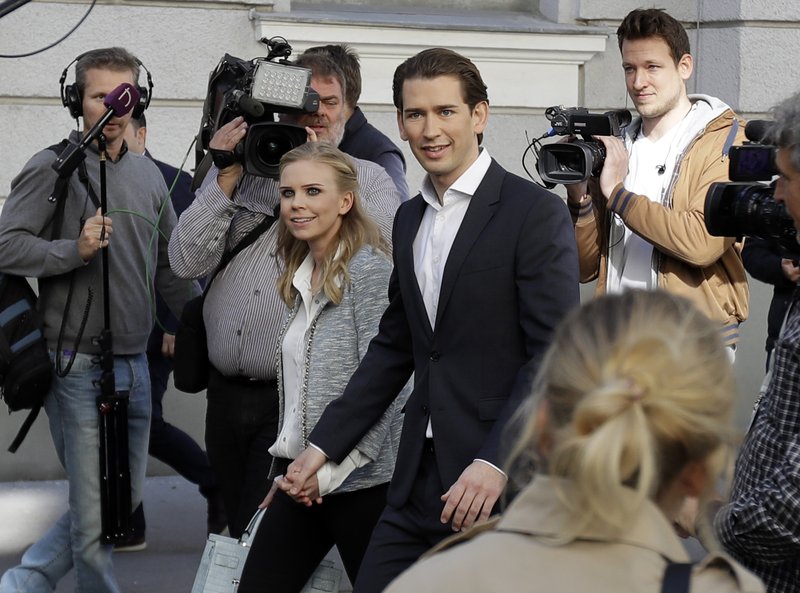VIENNA -- Austria's 31-year-old foreign minister declared victory for his party Sunday in a national election that set him up to become Europe's youngest leader and puts the country on course for a rightward turn.
Foreign Minister Sebastian Kurz claimed the win as results announced by the Interior Ministry showed his People's Party had a comfortable lead with almost all the ballots counted.
Noting that his center-right party had triumphed over the rival Social Democrats only twice since the end of World War II, Kurz called it a "historic victory."
"Today is not the day of triumph over others, but today is our chance for real change in this country," he told cheering supporters.
Still to be counted are more than 800,000 absentee ballots and ones cast by voters outside their home districts. The outstanding votes are due to be tallied by midweek.
However, the votes counted so far show that Austria, where moderate policies have been the norm for decades, will have a government with a harder line on migration and Muslims than one running the country now.
Both Kurz's party and the rightist Freedom Party -- Kurz's most likely government coalition partner -- campaigned on the need for tougher immigration controls, by quickly deporting asylum seekers whose requests are denied and cracking down on radical Islam.
Interior Minister Wolfgang Sobotka said the People's Party received 31.4 percent of the vote, a gain of more than 7 percentage points from the 2013 election. Kurz described that as the biggest jump in support in the party's history.
The Social Democratic Party of Austria, which now governs in coalition with the People's Party, had 26.7 percent, while the Freedom Party had 27.4 percent.
The election returns suggest a harder line on immigration resonated with voters more strongly than Social Democratic calls for social equality. Social Democratic Chancellor Christian Kern acknowledged as much, saying Sunday's results reflected "a push to the right."
The country now is governed by a coalition made up of the Social Democrats and the People's Party.
Much of the People's Party's appeal has been credited to Kurz. Since taking the helm in the spring amid growing strains within the governing coalition, he moved his center-right party further to the right.
But he avoids the inflammatory rhetoric of the rightist Freedom Party and its head, Heinz-Christian Strache.
That made Kurz's party appealing to voters who are uncomfortable with the Freedom Party but sensitive about immigration as large numbers of mostly Muslim migrants have entered Europe since 2015.
Strache modified the tone of his message, and the party is keen on shedding its past links to anti-Semitism. But it continues to attract a small neo-Nazi fringe.
Kurz, greeting supporters as he cast his ballot, said he hoped for "a good result so that real change can be possible."
Expressing optimism at a different polling station, Kern said that "we are planning a longer party."
Strache voiced optimism for "a good result and the chance for real change."
Left-leaning President Alexander Van der Bellen, who narrowly defeated a Freedom Party candidate in elections last year, said he "puts great value on pro-European government."
A Section on 10/16/2017
